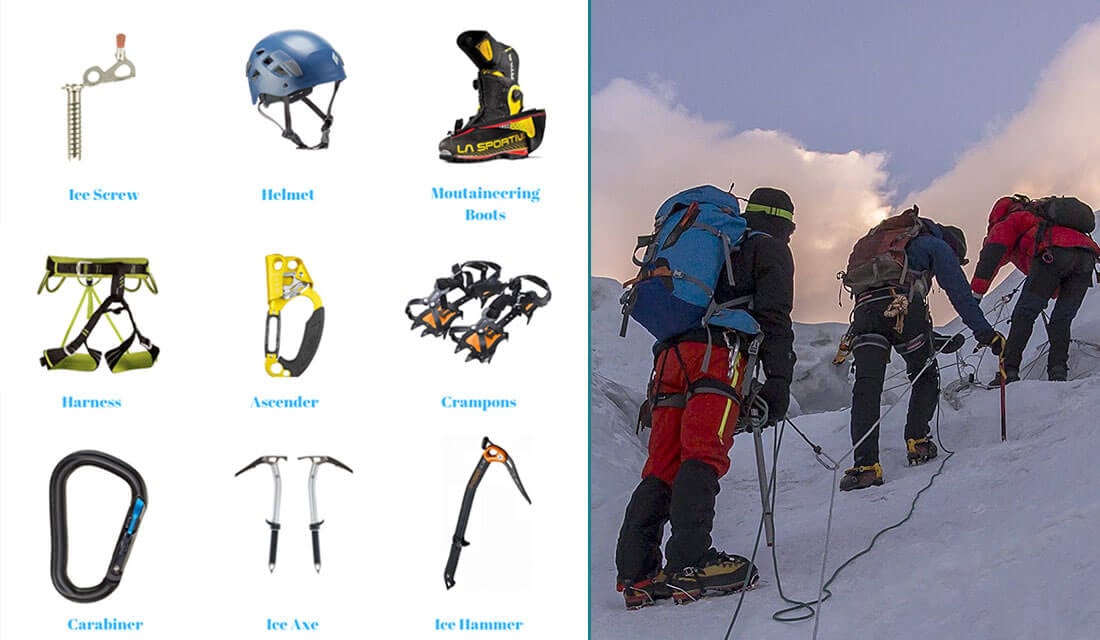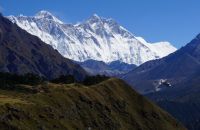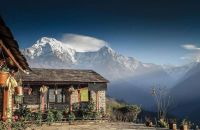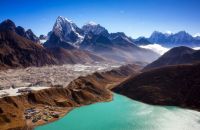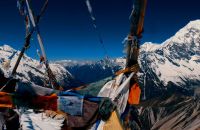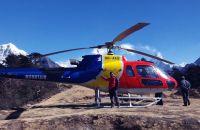Talk with our local travel specialist who can help organize your trip.
Climbing Gear List For Lobuche Peak
Lobuche Peak Climbing is one of the most sought-after Himalayan Trekking peaks of Nepal, considering the trekking route of the legendary Everest Base Camp it follows and its technical ascent over 6000m. Prominently standing at an altitude of 6119m in the Everest Region, Lobuche Peak climbing is gaining popularity among climbers, alpinists, and adventurers for the mind-boggling panoramic views of the Himalayas including the mighty Everest, Lhotse, Pumori, Ama Dablam, Nuptse, Island Peak, and others.
From the summit, the jagged Himalayas are out of this world. Lobuche Peak Climbing in Nepal is a challenging and rewarding adventure, something different than regular trekking- it entails the use of climbing gears and mountaineering equipment.
Apparently, without proper training and gears, no climb is doable; comfort, safety, and success of peak climbing are highly reliant on the gears and pre-climb training. That said, one must be meticulous while choosing gear and equipment, provided the pre-climb training will be conducted at the High Camp.
Choosing Lobuche Peak Gear List is a paramount concern for Lobuche climbing, yet it can be burdensome, sometimes perplexing. So here's a list of gear required for Lobuche Peak Climbing- A comprehensive Gear list required to summit Lobuche Peak.
Table of Content
Climbing Gear
Ascender
Ascender also called Jumar is a tool primarily used for ascending on a rope. It is made of metals, and provide sturdy support for an upward ascent. It is comfortable to use with gloves or mittens for a firm grip.
Alpine Climbing Harness
Alpine climbing harness or simply harness is a lightweight, adjustable and comfortable wearable gear. It comes with a waist belt and leg loop to secure lock around your waist and thigh with a rope or anchor point.
Crampons
Crampons are pointy boot-exterior typically used for precise movements on steep surfaces, ice fields, snow slopes, and ice-covered rocks. Crampons are key climbing gear for peak climbing. It is highly recommended to use 12 point crampons with anti-balling plates and horizontal frames.
Carabiners
A carabiner (karabiner) is yet another must-have gear for peak climbing- minimum 2 locking carabiners are obligatory. Carabiner consists of a metal loop used in safety-critical systems. It is conveniently used in all rope-intensive activities.
Descenders
Descender (Figure 8) is an aluminium 8-shaped tool used during descent- effectively helping to dissipate the heat caused by the friction. Descender is used with harness and carabiners for smooth descent on a rope.
Featured Trips
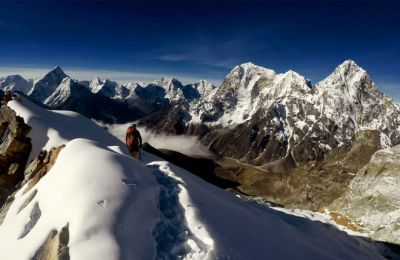
Lobuche Peak Climbing - 18 days
Lobuche Peak Climbing offers a challenging option for people who want to summit a Himalayan Peak above 6,000 meters in the Everest Region.
Inquire Now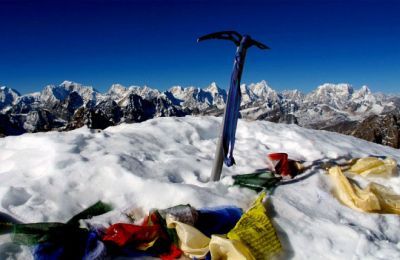
Lobuche East Climbing with EBC, Renjo, and Cho La Pass Trek - 19 days
Lobuche East Climbing with EBC, Renjo La, and Cho La Pass Trek is a combination trekking package that will reward spectacular mountain views and the diverse natural beauty of the Everest region.
Inquire NowWhere to travel next?
Get help from our travel specialists for holiday ideas that matches your interests.
Ice Axe
Ice Axe is indispensable when it comes to peak climbing- used for ascending as well as descending. It is made of stainless steel or aluminium, primarily used to cut and penetrate the ice surface or deep snow (can be used as a walking stick considering the assistance of shaft and spike.) Another remarkable use of Ice Axe is "Self-arrest."
Ice Hammer
Ice Hammer resembles Ice Axe at a glance and can be used as an alternative to adze of an ice axe. It is an optional tool in the gear list for mountaineering or climbing. Ice Hammer is predominantly used for hammering the hard ice.
Ice Screw
An Ice screw is a tubular screw (10 -23cm length) used during ice climbing or crevasse rescue. It is one of the important climbing arsenal used for anchor and running belays.
Helmet
The helmet is an imperative gear in the checklist of climbing gear- for the protection of head (obviously) and successful climbing. The importance of wearing a helmet while climbing cannot be overlooked, considering the consequences of not wearing it.
Mountaineering Boots
Sturdy and quality boots are must if you are thinking of any mountaineering and climbing adventure. Mountaineering Boots play a vital role in peak climbing; the importance of boots is self-evident considering injuries, frostbite and smooth movements and shifts on the snowfield and ice field.
Rope
No Rope, No Hope- without a rope, no ascending and no descending. There are two types of rope: Static and Dynamic rope. Static ropes are used for abseiling and dynamic for belaying. The major difference between static and dynamic rope is dynamic ropes are elastic while static ropes are stiff.
Tape Sling
A Tape Sling is a sewn loop of webbing used as anchors to climb a rope. It is made of nylon or Dyneema. It can be used in conjunction with other equipment for reduction of rope drag.
Featured Trips

Island Peak Climbing - 15 days
Island Peak Climbing takes you to Nepal’s popular peak in the Everest region. Loved by novice as well as experienced climbers, the mountain offers you the ideal conditions to hone your climbing skills.
Inquire Now
Mera Peak Climbing Itinerary - 14 days
Mera Peak Climbing Itinerary of 14 days led by a Sherpa climbing guide with 20 plus years of climbing experience. You will safely make it to the summit in just 2 weeks.
Inquire NowWhere to travel next?
Get help from our travel specialists for holiday ideas that matches your interests.
Clothing
Head
|
Sun Hat |
a lightweight hat (with visor) for shading the head |
|
Head Lamp |
outdoor headlamp (water-resistant preferred) for hand-free lighting |
|
Glacier Sunglasses |
high-quality sunglasses for protection against reflected UVA and UVB radiation |
|
Bandana or Head Scarf |
Bandana or head scarf keeps hair and face protected from dust and direct sunlight, rain, chilly wind |
|
Ski Goggle |
High-quality goggle for protection of eyes from sun and wind at higher altitude. |
Hand Gear
|
Liner Gloves |
Lightweight synthetic gloves for hand protection |
|
Wind stopper Fleece Gloves |
Mid-weight insulated gloves for hand protection against wind. |
|
Expedition Mittens |
expedition-rated mittens for the warmness of hand |
Upper Body
|
Fleece Jacket with Wind stopper |
warm fleece jacket for protection against the wind at higher altitude |
|
Waterproof shell jacket |
high-quality outdoor jacket (waterproof) |
|
Down Jacket |
high-quality and medium-weight down fill jacket |
|
Short -sleeve shirt |
half-sleeve innerwear with vapor-wicking capabilities |
Lower Body
|
Light-weight pants (two pairs recommended) |
|
Waterproof shell pants (two pairs recommended) |
|
Fleece or woolen trousers (two pairs recommended) |
|
Hiking shorts and trousers (one pair recommended) |
Feet
|
Lightweight inner socks (3 pairs recommended) |
|
Wool socks (3 pairs recommended) |
|
Cotton socks (1 pair recommended) |
|
Gaiters |
Personal stuff
|
Sleeping bag: 0-degrees Fahrenheit rated |
|
Inflatable sleeping pad: full-length inflatable sleeping pad recommended |
|
Water bottle: one-liter capacity bottle |
|
Small Travel Bag: simple and lightweight bag |
|
Expedition Duffel Bag |
|
Small padlocks |
|
Pee Bottle |
|
Pee funnel for women |
|
Trekking Poles |
|
Swiss army knife |
|
Toiletry bag |
Medical
|
Personal First Aid Kit |
|
Water purification tablets |
|
Anti-mosquito cream |
|
Anti-altitude sickness pills: Diamox or Acetazolamide |
|
Earplugs |
|
Anti-diarrhea pills |
|
Blister repair kit |
|
Antibiotics for chest infection |
|
Sun protection cream |
Toiletries
|
Towel |
|
Toothbrush and toothpaste |
|
Soap |
|
Deodorants |
|
Anti-bacterial Hand wash |
|
Hand Wipes |
|
Body Moisturizer |
|
Tissue Paper |
|
Nail Clipper |
Travel Luxuries
|
Books |
|
Journal |
|
Camera |
|
Map |
|
Compass / GPS |
|
Travel Games (Chess, playing cards) |
|
Bath suit |
|
Solar Charger |
- Written by: Naba Raj Amgai
Updated: May, 3, 2023

